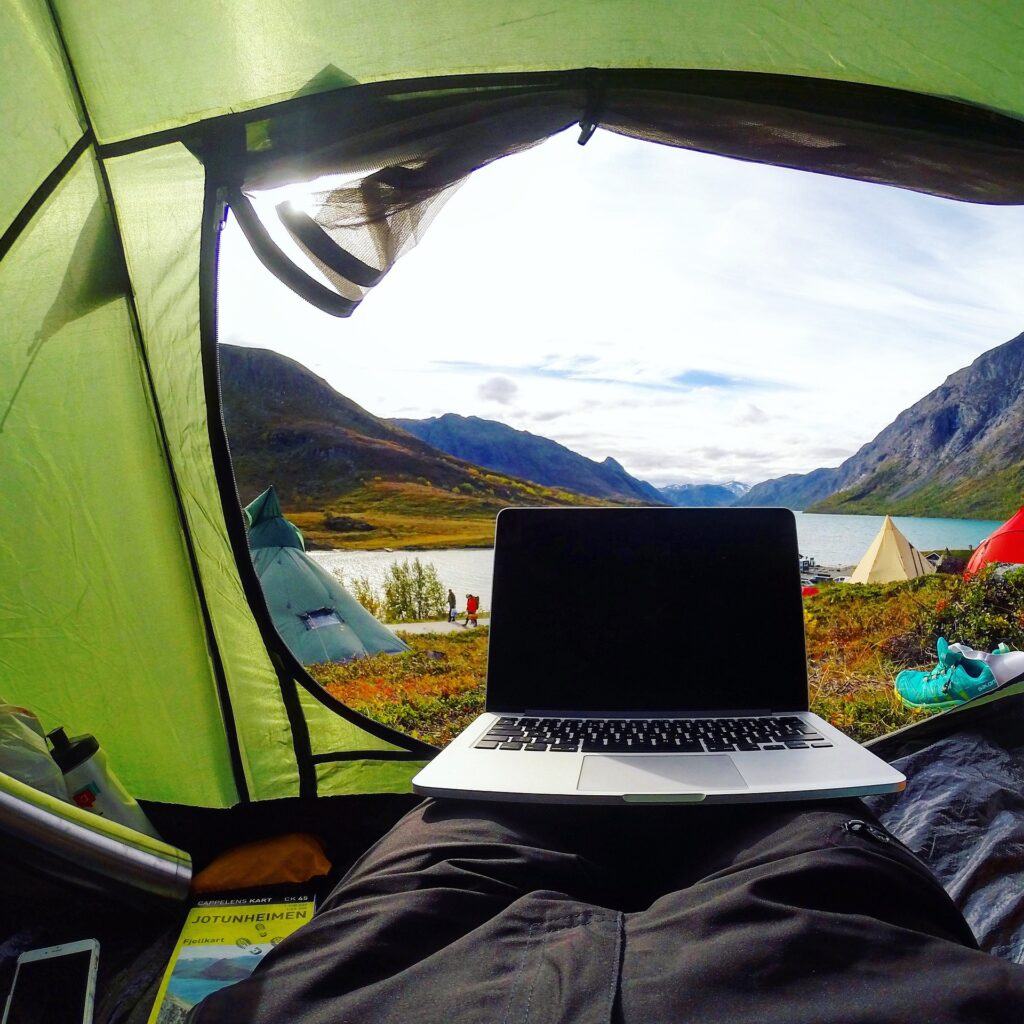Have you always wanted to travel the world, experience different cultures and explore the unknown? If that’s the case, you might want to consider becoming a digital nomad.
You may work as a digital nomad from anywhere in the globe as long as you have access to Wi-Fi. Fortunately, more jobs for digital nomads have arisen, allowing more people to work abroad and learn more about life.
If you desire to live a life of freedom and adventure, this article will show you how to travel the world as a digital nomad while ensuring that you will not be disappointed.
However, becoming a digital nomad is not an easy task. To do this, you will need some inherent skills and talents. You also need to know how and where you are earning your income. While many of these so-called work-from-where companies pretend to give you the tools to thrive in your nomadic digital life, most of them are designed to make more money from you than you do to help make money.
Table of Contents
What is a digital nomad?
 Before I get into a discussion on how to become a digital nomad, let’s first define what it actually is. So what exactly does it mean to become a digital nomad? What kind of freedom does it include? What kind of restrictions does it create? What should you know before embarking on this global trek around the planet, hiking from one country to the next?
Before I get into a discussion on how to become a digital nomad, let’s first define what it actually is. So what exactly does it mean to become a digital nomad? What kind of freedom does it include? What kind of restrictions does it create? What should you know before embarking on this global trek around the planet, hiking from one country to the next?
According to Wikipedia, digital nomads are “people who use telecommunications technologies to earn a living and generally lead their lives nomadically. Such employees typically work remotely – usually from overseas, in cafes, public libraries, co-working spaces, and even in recreational vehicles – to accomplish tasks and goals that traditionally took place in a single, stationary workplace.
Of course, that doesn’t mean you have to work for yourself. You can be a digital nomad and work for an employer. Some of the best travel writers have full-time jobs, traveling the world with their trusted laptops in their pockets, pounding on the keyboard and soaking up the heady air of the freedom of the open road, and walking around anywhere the wind (or their employer) is could take them.
However, a digital nomad is self-employed in the truest sense of the word. They are internet marketers and entrepreneurs trying to sell a lifestyle where they live and work on the beach, are rich and have endless resources to do what they want, when they want, where they want. But it’s not that simple. Don’t get drawn into all the hype or buy a system that almost guarantees your success as a digital nomad.
The problem? As a digital nomad, there is no elevator to success. You literally have to take the stairs. You need to invest the time to sustain your nomadic lifestyle. But back to the questions asked, there are certainly a few things that need to be sorted out before you embark on this journey. Where will you go Where will you live How do you make your living abroad? What will you do if there is a problem?
There are just so many competing factors at play here that you literally need to make sure you are organized and financially prepared for this adventure. In some travel destinations, your digital nomadic lifestyle can easily be disrupted by things like lack of internet access, loss of a passport, natural disasters, and theft, to name a few. So you need to be prepared. You need to have a backup plan or know what to do in the event of a medical, personal, or financial emergency.
Yes, I know. It doesn’t sound that glamorous when we hoist all those red flags, does it? Still, the nomadic lifestyle is a wonderful, fulfilling, and incredible experience when you can overcome all the subtleties. But you have to be prepared. If you’re serious about stepping down the proverbial street and throwing caution to the wind then that’s great, but don’t do it until you check at least a few boxes, cross those I dots, and all those t crosses.
Things to Consider Before Going on Your Trip
OK. So you’ve made up your mind. You have set yourself the goal of becoming a self-proclaimed wanderlust and moving freely where the wind takes you. Sure, it sounds great. Absolutely great. However, before embarking on your journey to becoming a digital nomad, there are a few things to consider.

# 1 – healthcare
While traveling around the world may seem like a grand adventure, you still need to take care of your health. From vaccinations for visiting certain parts of the world to exams and tests in other parts of the world to any unforeseen emergencies that can and do occur, your health needs to be a concern while you are busy wandering the world.
From finding an English-speaking family doctor to ensuring you have a dentist visit in case of an emergency or the phone number in the event of an accident or other worse situation, it’s important to gather the right information and get overseas health insurance before you go.
There are many plans that you can cover during your stay abroad. It is best that you search and find the right ones that fit your situation. Of course, this also depends on which country you live in and where you are traveling. Still, you can easily find 6-month plans and even 12-month plans abroad that should cover most emergency situations.
All in all, when it comes to your health, here is a checklist of points to consider before you travel:
- Research and conclusion of travel health insurance
- When looking for accommodation, be sure to find the nearest hospital, emergency room, dentist, and clinic
- If you cannot speak the language, find someone who can translate for you in an emergency
# 2 – banking
While banking is a convenience in much of the developed world, where credit cards, debit cards, and even services like Apple Pay and other smartphone payment systems dominate the landscape, making cash almost obsolete, this doesn’t necessarily apply to the rest of the world. You also need to be wary of bank fraud, theft, and other dangers depending on where in the world you are.
There is also the problem of having cash and finding a good place to convert your currency with good exchange rates. I’ve found that the best way to get the local currency is to take the cash from an ATM, which usually offers cheap exchange rates, as long as it’s not at an airport. Never change money at an airport unless you want to pay an exorbitant exchange rate.
You need to realize how easy or difficult it will be to pay with or without cash. If you travel through Eastern Europe, you will find that cash is more popular than in Canada or Australia, for example. You also need to be wary of certain ATMs that are designed to scan your card number or steal your ATM PIN code through sneaky devices attached to the machine itself.
Overall, you should consider the following when doing banking abroad:
- The popularity of credit cards and debit cards used for purchases in your destination country
- If you are using a debit or credit card, whether your bank will charge an international transaction fee (most do)
- Costs for withdrawing cash (per-transaction fee and exchange rate fee) at a foreign ATM
- The location of banks or ATMs near where you are

# 3 – housing
Of course, living is a major concern no matter where you travel. Possibly one of the biggest costs for digital nomads is actually having a roof over their heads. Now some prefer to take it rough, sleep on the beach or surf on couches. Personally, this is not for me, but obviously, if you are into that sort of thing, you will obviously not put as much of a burden on your housing costs.
Depending on where you want to go, you should carefully consider your living situation. While some destinations have great short-term apartments or houses for rent, not all do. The best bet? Use a website like Airbnb if you want to stay for a while and try to negotiate the price if you come for more than a week or two.
That being said, you should really research the area before deciding on anything long-term. No matter what advice you read, it is very important to know first-hand the neighborhoods in the city where you want to become a digital nomad. I prefer to grab a short-term rental or a hotel room for a few days in a popular tourist area, then explore the area and, if possible, ask the concierge or local residents for advice.
Overall, here are the most important tips for living as a digital nomad:
- Research the area well and use your personal network (if possible) to find out more about the neighborhoods
- Reach people who live and work as digital nomads in these cities via Facebook groups
- Secure temporary digs before making long-term decisions – you can use sites like Couch Surfing, Airbnb, and Craigslist to arrange something for a few days or weeks while you do your due diligence
- Pay special attention to neighborhood crime, as theft is usually the biggest problem for digital nomads overseas
# 4 – transportation
Another important aspect of a digital nomad is transportation. How are you going to get around the city where you ultimately choose to stay for a longer period of time? If you live in a busy metropolis but are out of the center, how difficult will it be to do things like shop for groceries and run errands when necessary?
You can find mostly good public transport in many places that are ideal for digital nomads. But you still have to research and see if the city has a good subway or bus system? Is it ideal for getting around without a car or if you are in the middle of the Costa Rican jungle you may need a couple of wheels?
Take the time to do your due diligence. Choosing a city because of the low cost of living makes sure your transportation is covered. If you are planning a long stay, say more than 6 months, you will also need to take care of things like an international driver’s license if you plan to drive a car.
Overall, the following points must be observed for transport:
- Is there a decent public transport system with buses and subways?
- Are there ride-hailing services like Uber or Lyft in town?
- What is the cost of a taxi ride if you don’t have a service like Uber or decent public transportation?
# 5 – language
If you speak English as a native language, you are in luck as English is the predominant language in much of the world. However, what you will usually find in foreign lands that function as thriving centers for digital nomads is that you will find the cities and metropolises full of English speakers while the countryside and suburbs are fewer.
Even in certain cities and metropolises, it can happen that people struggle with the language. Depending on how far you are from home, so to speak, this experience will vary. Don’t rely on people speaking your language wherever you go. This is definitely a rookie mistake.
Even if you don’t need to be fluent in the language of your travel destination, you should learn the basics. Get a sentence or conversational vocabulary or download it to your phone. You can also opt for audiobooks that will help you do the same. There are a number of really great ones that come in handy, like Pimsleur’s.
Some important points to consider here are:
- Make sure that you can do without language skills at your destination
- Get a sayings book or audiobook to learn some of the basics of the language
- Make sure you have an app like Google Translate on hand on your phone to help you out in an emergency

# 6 – Telephone & Internet
Having access to means of communication is one of the most important aspects of being a digital nomad. Having a cell phone and internet access is paramount. However, this can often be difficult when traveling abroad, especially if it’s your first time.
The most important thing is that you don’t always have to take your phone with you abroad and change the SIM card. If your phone is connected to a network, you cannot use a SIM card from another network. You might end up learning this the hard way.
The solution? Find an inexpensive unlocked phone that you can use abroad that gives you some basic internet and voice functionality. It doesn’t have to be fancy or expensive, but it is a necessity for getting around and communicating with others.
# 7 – income
The central goal of every digital nomad is to earn enough income to make a living while traveling and around the planet. Depending on how you choose to generate that income, your nomadic adventures can either be the most enjoyable experience or one of the most stressful.
The worst part about wandering to some far-reaching destination on the planet is when you get into a situation where you run out of money and you have no one to turn to. However, if you can find a travel destination that is relatively cheap to live in, the chances that you will run into this problem are far less likely. Nevertheless, emergencies can and can happen.
Do your best to organize your finances before you leave. Pay off as much of your debt as you can and make sure you have a stable source of income or clients to keep you working during your trip. Whenever possible, make sure you have access to some savings in case you can’t make an income or go through a losing streak in a particular month.
9 jobs for digital nomads who want to travel the world
- Dropshipping: Sell physical products online without keeping inventory. You may want to try these business ideas for your business.
- Writing: Create content for other brands and trade time for money
- Blogging: Create your own content asset and monetize it through ads, coaching, and information products
- SEO Optimization: Helps brands optimize their websites for search
- Affiliate Marketing: Drive traffic to other brands’ products and earn a commission
- Website Design: Sell website themes or modify websites for bloggers, shopkeepers, etc.
- eCommerce Tasks: You can help eCommerce store owners with their tasks
- Product Photography: You can photograph products in landscapes all over the world
- Remote Working: You can check Craigslist, ProBlogger, or Upwork for remote opportunities
What’s the secret to becoming a successful digital nomad?
 In order to be successful, as a digital nomad and really be able to roam the planet and go where the wind takes you, you need passive income. Yes, the holy grail of all types of income. Why? Because it’s automatic. So, in order to truly embrace the wanderlust in you, to travel the world and live as a digital nomad, you have to make sure that you can get by in the event that you cannot find a job or earn an income for whatever reason.
In order to be successful, as a digital nomad and really be able to roam the planet and go where the wind takes you, you need passive income. Yes, the holy grail of all types of income. Why? Because it’s automatic. So, in order to truly embrace the wanderlust in you, to travel the world and live as a digital nomad, you have to make sure that you can get by in the event that you cannot find a job or earn an income for whatever reason.
I know. I know. Generating passive income is difficult. That is really correct. But the only reason I’ve been able to be a digital nomad for the past decade is because of the amazing power of passive income. While this is not a need or requirement to get started on your adventure, it definitely helps.
While I was able to neatly organize my affairs in support of my wanderlust goals and desires, it was by no means easy. To become a digital nomad, you not only need to have a passion for travel but also have a clear understanding of how to generate income online that pays you automatically. In other words, you need to master the art of generating passive income.
Now I know what you think you don’t need passive income to become a digital nomad. That’s correct. You don’t. You could go to a city like Chiang Mai and just live cheap, get jobs in the digital gig economy, write articles, do graphic design, code or, for a little personal face-to-face interaction, even teach English to the locals.
Yes, you can do that.
However, if you want to become a true digital nomad, nomadic warrior if you will, wherever you are in charge, and disruption of internet access, laptop theft, or any other thing that can happen on the street, you have to don’t look around to find a way to make ends meet. If you have passive income – the kind that is automatically generated month to month with no maintenance required – then you really are free.



